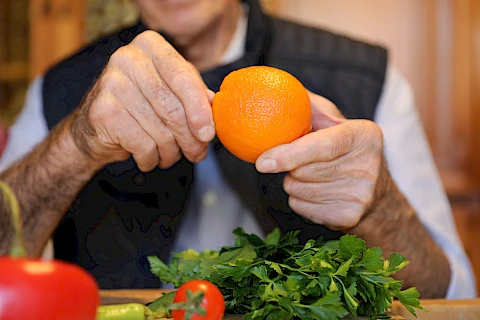
Is your immune system ready for winter? The drop in temperature and increased time spent indoors can make older adults more susceptible to illnesses. Seniors often face challenges like decreased appetite or difficulties in accessing nutritious foods, making it harder to sustain a robust immune system. But with the right nutrition, you can boost your immunity and stay healthy throughout the season.
Essential Nutrients for Immune Support
A well-rounded diet packed with essential nutrients can help keep the immune system in top shape. Vitamin C, known for its immune-boosting properties, is vital for seniors. It's found in abundance in citrus fruits like oranges and grapefruit, as well as in bell peppers and strawberries. Incorporating these foods into daily meals can help bolster immune function.
During winter, the lack of sunlight makes it harder to get enough vitamin D, a cornerstone of immune health. Fortified foods, like some dairy products and cereals or a doctor-recommended supplement, can help ensure adequate intake.
Leafy greens like spinach, kale, and Swiss chard are rich in nutrients and can be easily added to soups, stews, or smoothies, making them a versatile option for a balanced diet. Berries such as blueberries and raspberries are high in antioxidants. They can be an excellent snack on their own or added to oatmeal or yogurt for a nutritious breakfast. Both garlic and ginger have natural immune-boosting properties. Adding them to soup, stir-fries, or roasted vegetables can add flavor and health benefits.
Probiotics are beneficial bacteria that support gut health, which is closely linked to immune function. Foods like yogurt and other fermented products such as kefir and sauerkraut can help maintain a healthy gut flora.
Nuts and seeds like almonds, walnuts, flaxseeds, and chia seeds provide healthy fats, zinc, and protein, which are essential for a strong immune system. They make good snacks or can be sprinkled on salads and yogurt.
Creating a Balanced Winter Diet
To create a diet that's both balanced and immune-boosting, here are some tips:
- Plan meals that include a variety of colorful vegetables, lean protein, and whole grains. This ensures a broad intake of nutrients.
- Stay hydrated. Even in winter, it's important to drink enough fluids. Warm beverages like herbal teas or broth-based soups can keep seniors hydrated and offer extra nutrients.
- Consider hearty meals like vegetable stews, chicken soup, or lentil chili that are warming and provide nutrition.
Overcoming Common Nutritional Challenges
Seniors may face some nutritional challenges during the winter, but there are strategies to overcome them. If appetite decreases, focus on nutrient-dense foods rather than large meals. Small, frequent meals or snacks may be easier to manage.
Do you have limited mobility or use of transportation? Use grocery delivery services or ask family members to assist with shopping to ensure access to fresh produce and other healthy options. Don't forget to keep meals interesting by trying new recipes or ingredients. This helps ensure a broad range of nutrients and keeps meals enjoyable.
Need a Hand in the Kitchen? Count On Senior Helpers!
Focusing on key nutrients and incorporating immune-boosting foods can support your health and well-being during the colder months. Prioritizing a balanced diet helps build a strong immune system, making it easier to fend off winter's challenges.
Did you know that professional in-home caregivers can assist with menu planning, shopping, and meal preparation? For personalized support in Milwaukee, Glendale, Brookfield, and Germantown, contact us at Senior Helpers Milwaukee. Your health is our priority, and we're here to help you thrive this winter.